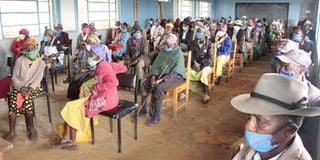Premium
Covid-19: Over one million vulnerable Kenyans to get Sh4.4bn

Beneficiaries of the Inua Jamii programme wait to be served by Kenya Commercial Bank staff at Meru Primary School in Meru town on April 22, 2020.
More than one million cash transfer beneficiaries will from Tuesday start receiving the Sh4.4 billion released by the government through the Ministry of Labour and Social Protection
The cash is meant to cushion vulnerable people such as orphans and at-risk children from the adverse effects of the Covid 19 pandemic.
The 1,091,166 beneficiaries successfully opened bank accounts for the three programmes under the Consolidated Cash Transfer Programme (CCTP), which were successfully submitted to the Management Information System (CCTP MIS).
“Each beneficiary will receive Sh4,000 to cover the July-August payment cycle. Beneficiaries or caregivers can access the payment at any time over the next six months,” the ministry said in a statement ti newsrooms on Tuesday.
They are allowed to withdraw all or part of it at any time during the six-month period.
A total of 293,665 beneficiaries enrolled in the orphans and vulnerable children cash transfer programme will receive Sh1.2 billion while another 763,553 enlisted under the older persons programme will be paid Sh3 billion
Some 33,948 beneficiaries in the persons with severe disabilities category will receive Sh1.4 million.
How to get cash
The beneficiaries will receive payments through the contracted Payment Service Providers (PSPs), which include the Co-operative, Equity, KCB and Kenya Post Office Savings banks.
They can get the cash over the counter at the branches where they opened their accounts.
They will also be able to collect the cash from the nearest authorised agents of the banks where they opened their accounts.
Those with invalid biometric details and who had applied for PINs from the banks through the field office can also access the payments through ATMs using the Inua Jamii payment card.
For those without biometric records, cash-on-transit payments shall be arranged between the officers and the branch managers in the field.
“Beneficiaries or caregivers are required to produce their Inua Jamii and identity cards. Those going for payment for the first time must transact biometrically,” the ministry said.
Streamlined process
Due to delayed payments for the July-August cycle, the government is planning a double payment after this round.
For a smooth process, it has instructed the PSPs to deliver cash in a timely manner and ensure correct amounts.
County and sub-county officers in Inua Jamii were asked to coordinate and manage the process.
“PSPs should also ensure 80 per cent of beneficiaries access funds within a six kilometre radius in Zone A (urban areas) and Zone B (rural areas), and within a 20km radius in Zone C (remote areas)," the ministry said.
"The banks must capture biometric data and deliver payment cards to the beneficiaries."
Taming fraud
To deal with cases of fraud, the government has asked the banks to report any suspicious transactions.
“Cases of forgeries, fraud and theft must be reported to the ministry immediately. Banks should also advise beneficiaries on agents in their locations or counties," the statement said.
"They should also provide a list of agents in their counties to the county coordinators [for children and social development]."
They will hold meetings with relevant stakeholders to address issues emanating from the programme.
The stakeholders include members of Parliament and county assemblies, Interior ministry officials, PSPs and the media.
Additional information on the payment process is on the State department’s website.






